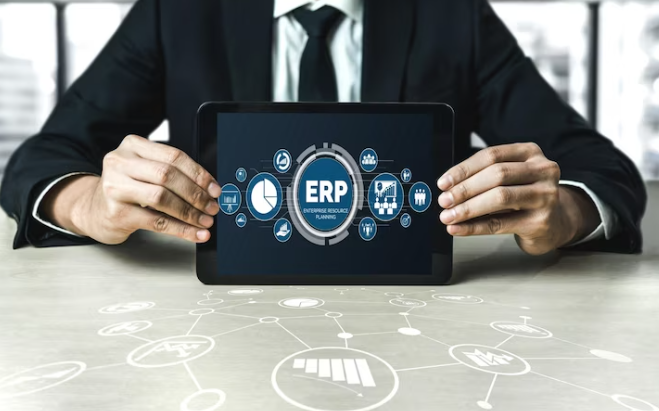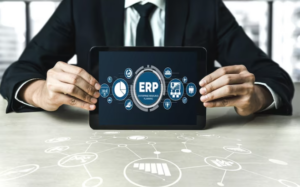best erp In the fast-paced and data-driven world of modern business, the need for effective enterprise management is more critical than ever. Enterprise Resource Planning (ERP) systems have emerged as invaluable tools for organizations seeking to streamline operations, improve efficiency, and make data-driven decisions. With numerous ERP solutions available, it’s essential to delve into the landscape of ERP software to identify the best options for your business. In this extensive guide, we’ll explore the leading ERP systems, their key features, the benefits they offer, and the factors to consider when choosing the best ERP solution.
Understanding Enterprise Resource Planning (ERP)
The Essence of ERP
Enterprise Resource Planning, often referred to as ERP, is a comprehensive software suite designed to help businesses manage and integrate core operations, such as finance, human resources, supply chain management, and more. ERP systems provide a unified platform for data, processes, and reporting, enabling organizations to work efficiently, make informed decisions, and adapt to changing market dynamics.
Why ERP Matters
The Importance of ERP
ERP systems offer several advantages that make them indispensable for modern businesses:
- Efficiency: ERP systems streamline operations by automating processes, reducing manual tasks, and providing real-time data, ultimately saving time and resources.
- Data-Driven Decision-Making: Access to real-time data and advanced reporting tools empowers organizations to make better-informed decisions, react quickly to market changes, and execute strategic moves.
- Scalability: ERP solutions can be tailored to the specific needs of organizations, making them suitable for businesses of all sizes, from startups to large enterprises.
- Cost Savings: By optimizing operations and reducing inefficiencies, ERP systems help organizations cut costs. Moreover, cloud-based ERP eliminates the need for costly infrastructure and maintenance.
- Compliance: ERP solutions provide tools to help organizations adhere to various financial and industry-specific regulations and standards.
- Customer Satisfaction: Enhanced customer relationship management, e-commerce capabilities, and streamlined processes result in better customer experiences, promoting customer loyalty and recommendations.
Key Features of the Best ERP Solutions
The Must-Have Features
The best ERP solutions offer a range of essential features:
- Financial Management: Effective management of financial operations, including accounting, budgeting, financial reporting, and revenue recognition.
- Supply Chain Management: Tools for demand planning, procurement, order management, and inventory management to facilitate efficient supply chain operations.
- Manufacturing Execution: Capabilities for managing production schedules, quality control, and shop floor operations, enhancing production efficiency.
- Customer Relationship Management (CRM): Integrated CRM modules for lead management, customer interaction tracking, and customer engagement insights, improving sales and customer satisfaction.
- Human Capital Management (HCM): Functions for personnel management, payroll processing, time and attendance tracking, and employee self-service, ensuring efficient and compliant HR processes.
- Business Intelligence and Reporting: Advanced analytics and reporting tools, including custom report creation and real-time data access for tracking key performance indicators and monitoring business performance.
- Mobile Accessibility: Mobile applications and responsive interfaces that allow employees to access ERP systems from anywhere, improving accessibility and responsiveness.
- Integration and Customization: Integration capabilities with other business systems and third-party applications, as well as flexibility for customization to meet specific business needs.
The Leading ERP Solutions
An Overview of the Best ERP Systems
To help you make an informed decision about the best ERP solution for your business, we’ll explore some of the top contenders in the ERP landscape, including their key features and areas of specialization.
SAP Business One
Key Features:
- Financial management, including accounting, budgeting, and reporting.
- Supply chain management with procurement and inventory control.
- Robust CRM functionalities to manage customer relationships.
- Human resources and payroll management.
- Real-time data analytics and reporting.
- Scalable for businesses of all sizes.
Specialization: SAP Business One is ideal for small and mid-sized businesses seeking comprehensive ERP capabilities. It offers a user-friendly interface and easy integration with other SAP products, making it a versatile choice.
Oracle NetSuite
Key Features:
- Financial management with advanced revenue recognition.
- E-commerce capabilities for online sales and customer engagement.
- Comprehensive supply chain management, including demand planning and procurement.
- CRM functionality to track customer interactions and leads.
- Real-time analytics and reporting.
- Scalable for businesses of all sizes.
Specialization: Oracle NetSuite is a cloud-based ERP solution that suits businesses of various sizes and industries. It is known for its scalability, flexibility, and advanced features for financial management.
Epicor ERP
Key Features:
- Robust financial management with real-time data access.
- Supply chain management for efficient procurement and order management.
- Manufacturing execution tools for production schedule control.
- Integrated CRM module for lead management and customer engagement.
- Human capital management functions.
- Advanced analytics and reporting features.
- Mobile accessibility for decision-makers on the go.
Specialization: Epicor ERP is recognized for its adaptability and versatility, making it suitable for businesses of all sizes and industries. It offers comprehensive financial management and advanced analytics.
Microsoft Dynamics 365
Key Features:
- Financial management with advanced reporting and budgeting.
- Sales and customer service capabilities for CRM.
- Integration with other Microsoft products and services.
- Scalable for businesses of all sizes.
Specialization: Microsoft Dynamics 365 is known for its seamless integration with other Microsoft products, making it a strong choice for businesses already using Microsoft solutions. It is suitable for small and mid-sized businesses looking for a holistic approach to customer engagement.
Infor CloudSuite
Key Features:
- Financial management with advanced budgeting and financial reporting.
- Comprehensive supply chain management for procurement and inventory control.
- E-commerce capabilities for online sales and customer engagement.
- Scalable for businesses of all sizes.
Specialization: Infor CloudSuite offers a range of industry-specific ERP solutions, making it ideal for organizations with unique industry requirements. It is designed for businesses of various sizes seeking tailored ERP solutions.
Choosing the Best ERP Solution
Factors to Consider
Selecting the best ERP solution for your business involves careful evaluation of several factors:
- Business Size and Industry: Choose an ERP system that suits your business size and industry requirements. Consider whether the ERP solution offers industry-specific modules.
- Scalability: Ensure that the ERP system can grow with your business as it expands.
- Integration: Check if the ERP system can seamlessly integrate with your existing systems and third-party applications.
- Customization: Consider the level of customization the ERP system allows to meet your specific business needs.
- Mobility: Evaluate the mobility features, including mobile apps and responsive interfaces, which can be vital for decision-makers on the move.
- User Training and Adoption: Ensure that you have a plan for comprehensive user training to make the most of the ERP system.
- Data Migration and Integration: Develop a strategy for migrating data from existing systems and integrating the new ERP solution.
- Ongoing Support and Maintenance: Decide whether you will rely on an in-house IT team or an ERP partner for ongoing support and maintenance.
Conclusion
The best ERP solution for your business depends on various factors, including your business size, industry, and specific needs. ERP systems offer a range of essential features that enhance operational efficiency, data-driven decision-making, scalability, cost savings, regulatory compliance, and customer satisfaction. By carefully evaluating these factors and exploring the leading ERP solutions in the market, you can choose the best ERP system to help your organization thrive in the dynamic world of modern business.

